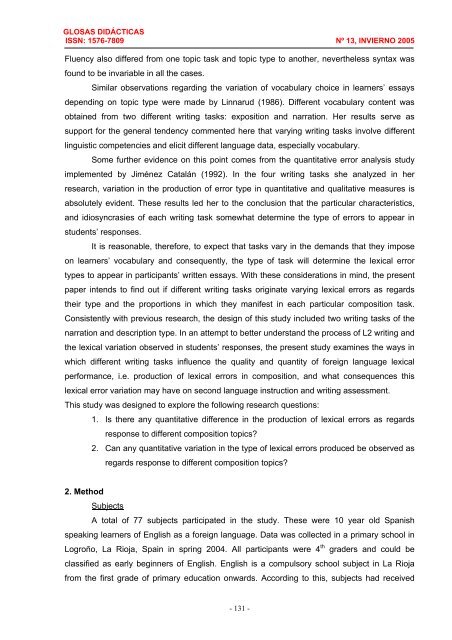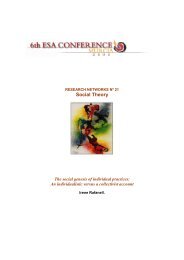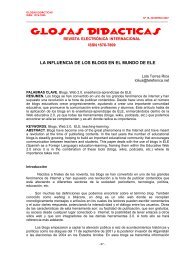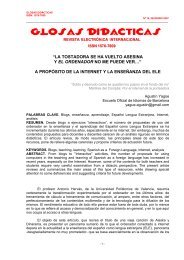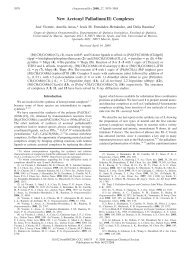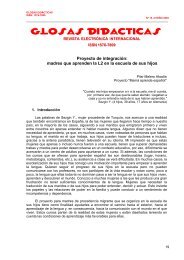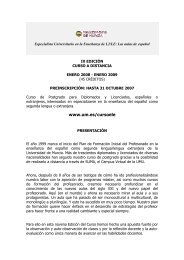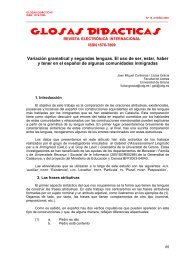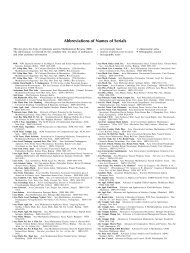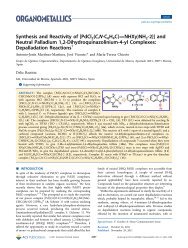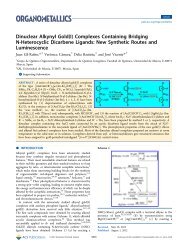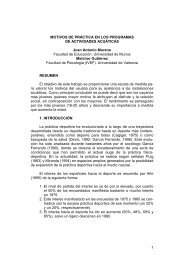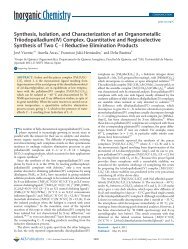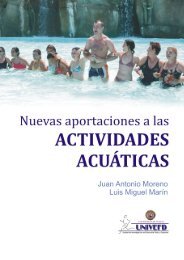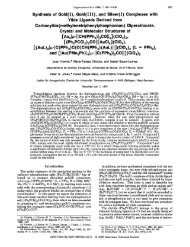descarga del número 13 de glosas didácticas completo
descarga del número 13 de glosas didácticas completo
descarga del número 13 de glosas didácticas completo
Create successful ePaper yourself
Turn your PDF publications into a flip-book with our unique Google optimized e-Paper software.
GLOSAS DIDÁCTICAS<br />
ISSN: 1576-7809 Nº <strong>13</strong>, INVIERNO 2005<br />
Fluency also differed from one topic task and topic type to another, nevertheless syntax was<br />
found to be invariable in all the cases.<br />
Similar observations regarding the variation of vocabulary choice in learners’ essays<br />
<strong>de</strong>pending on topic type were ma<strong>de</strong> by Linnarud (1986). Different vocabulary content was<br />
obtained from two different writing tasks: exposition and narration. Her results serve as<br />
support for the general ten<strong>de</strong>ncy commented here that varying writing tasks involve different<br />
linguistic competencies and elicit different language data, especially vocabulary.<br />
Some further evi<strong>de</strong>nce on this point comes from the quantitative error analysis study<br />
implemented by Jiménez Catalán (1992). In the four writing tasks she analyzed in her<br />
research, variation in the production of error type in quantitative and qualitative measures is<br />
absolutely evi<strong>de</strong>nt. These results led her to the conclusion that the particular characteristics,<br />
and idiosyncrasies of each writing task somewhat <strong>de</strong>termine the type of errors to appear in<br />
stu<strong>de</strong>nts’ responses.<br />
It is reasonable, therefore, to expect that tasks vary in the <strong>de</strong>mands that they impose<br />
on learners’ vocabulary and consequently, the type of task will <strong>de</strong>termine the lexical error<br />
types to appear in participants’ written essays. With these consi<strong>de</strong>rations in mind, the present<br />
paper intends to find out if different writing tasks originate varying lexical errors as regards<br />
their type and the proportions in which they manifest in each particular composition task.<br />
Consistently with previous research, the <strong>de</strong>sign of this study inclu<strong>de</strong>d two writing tasks of the<br />
narration and <strong>de</strong>scription type. In an attempt to better un<strong>de</strong>rstand the process of L2 writing and<br />
the lexical variation observed in stu<strong>de</strong>nts’ responses, the present study examines the ways in<br />
which different writing tasks influence the quality and quantity of foreign language lexical<br />
performance, i.e. production of lexical errors in composition, and what consequences this<br />
lexical error variation may have on second language instruction and writing assessment.<br />
This study was <strong>de</strong>signed to explore the following research questions:<br />
1. Is there any quantitative difference in the production of lexical errors as regards<br />
response to different composition topics?<br />
2. Can any quantitative variation in the type of lexical errors produced be observed as<br />
regards response to different composition topics?<br />
2. Method<br />
Subjects<br />
A total of 77 subjects participated in the study. These were 10 year old Spanish<br />
speaking learners of English as a foreign language. Data was collected in a primary school in<br />
Logroño, La Rioja, Spain in spring 2004. All participants were 4 th gra<strong>de</strong>rs and could be<br />
classified as early beginners of English. English is a compulsory school subject in La Rioja<br />
from the first gra<strong>de</strong> of primary education onwards. According to this, subjects had received<br />
- <strong>13</strong>1 -


